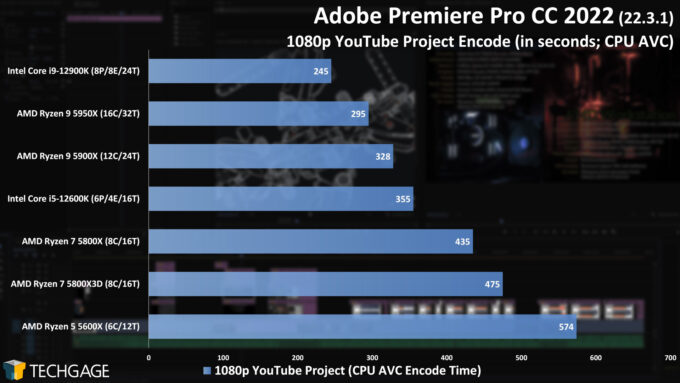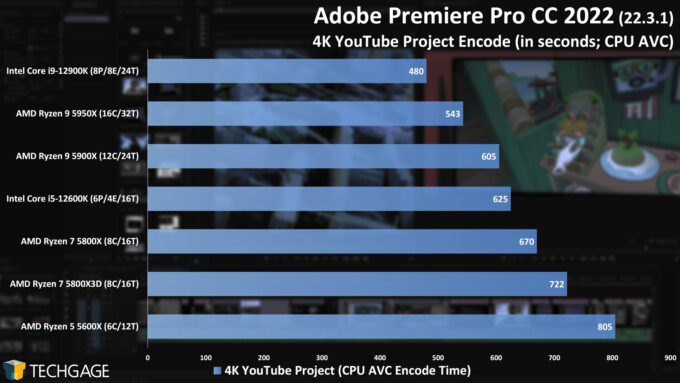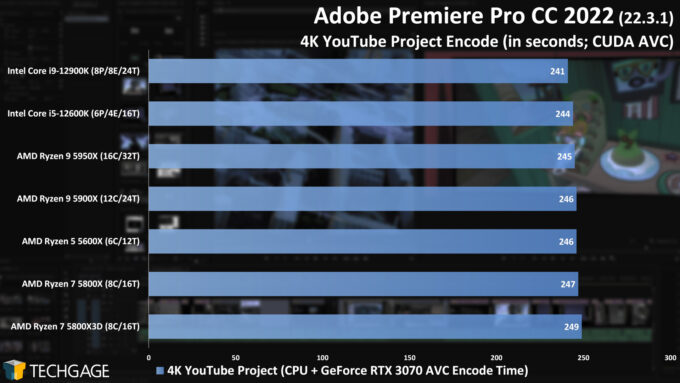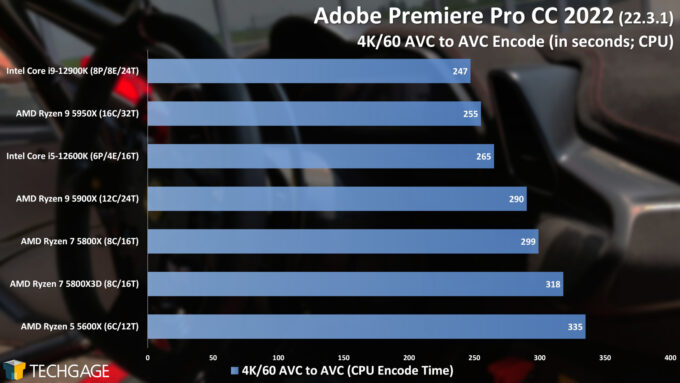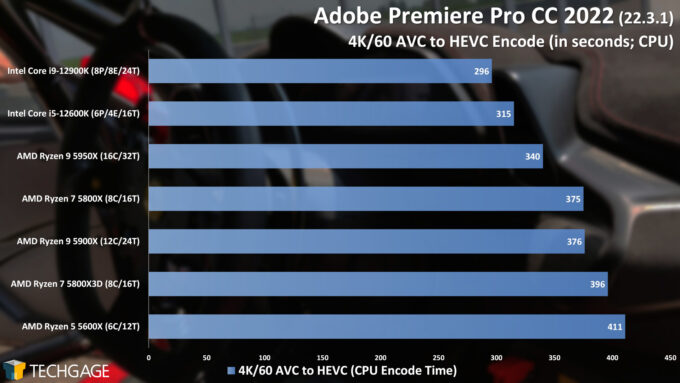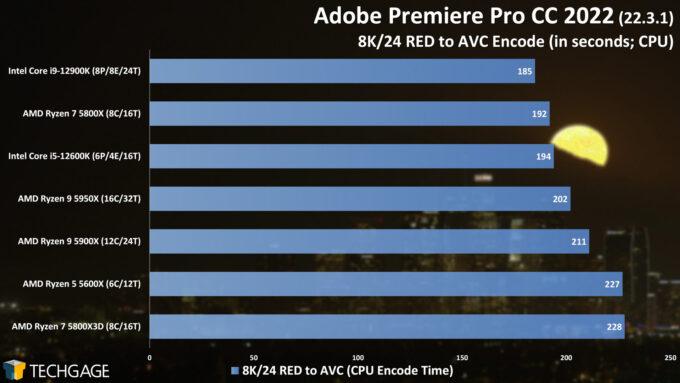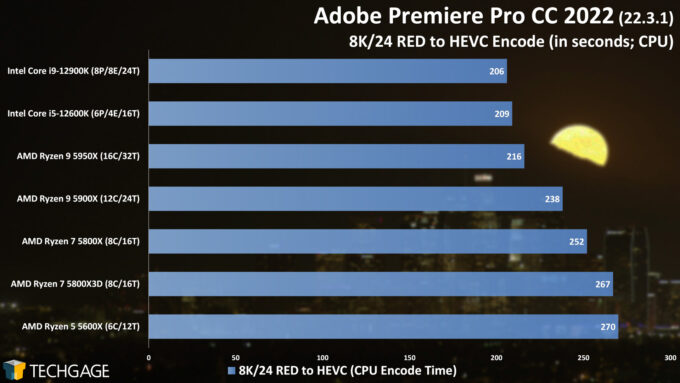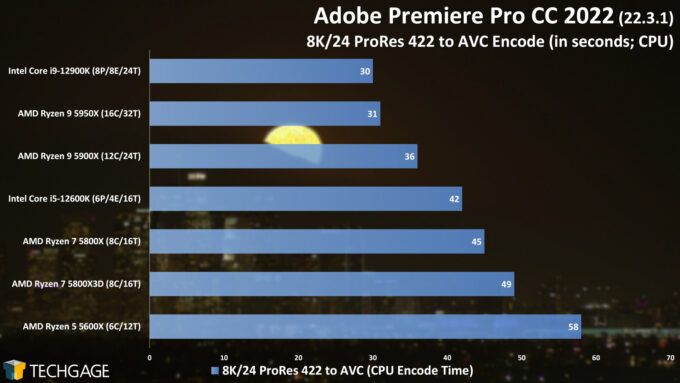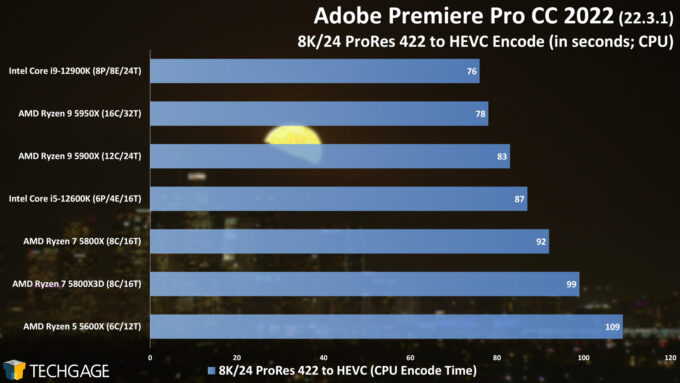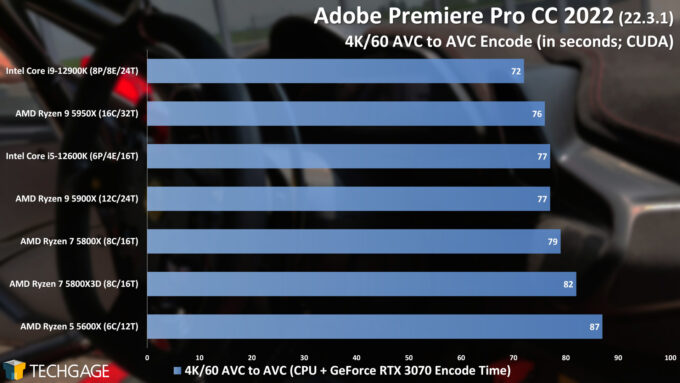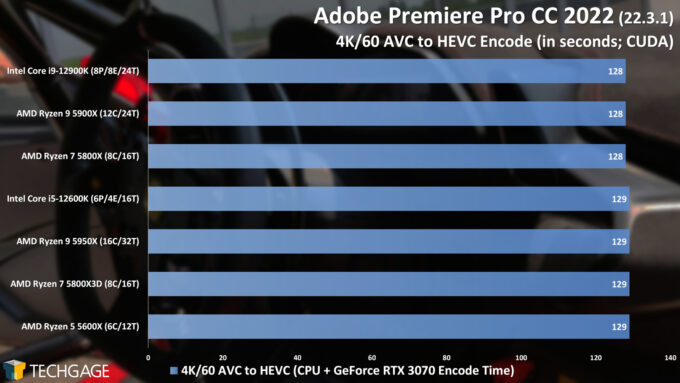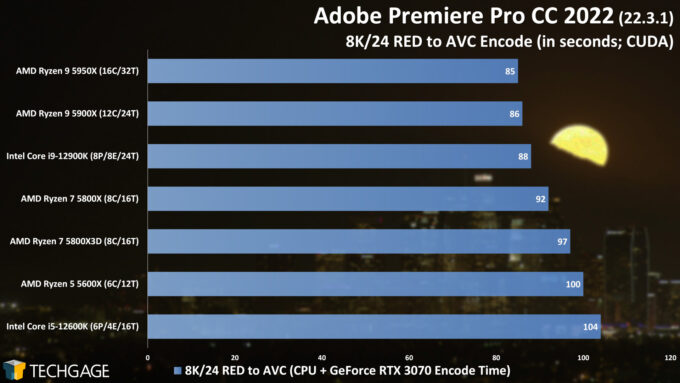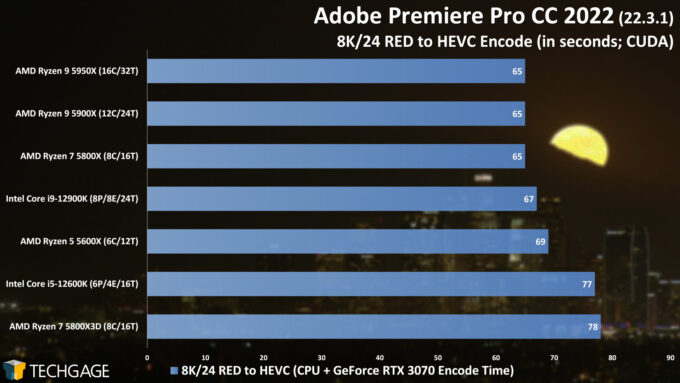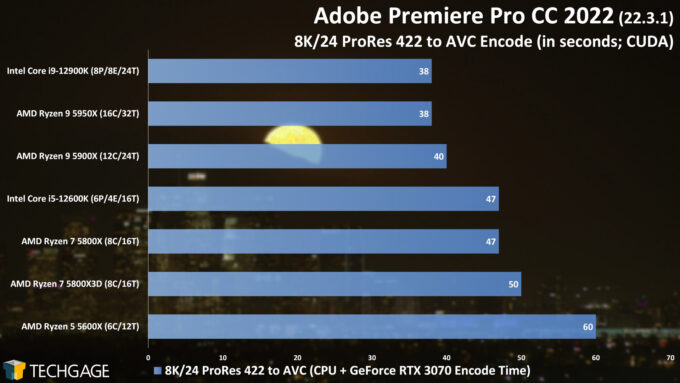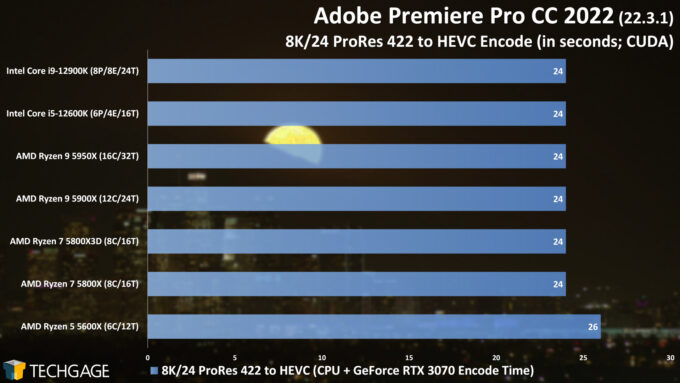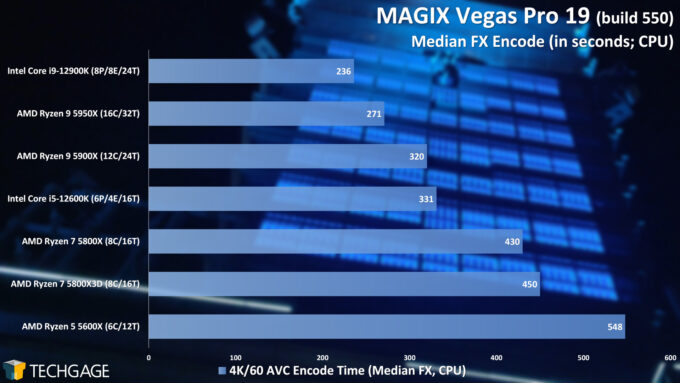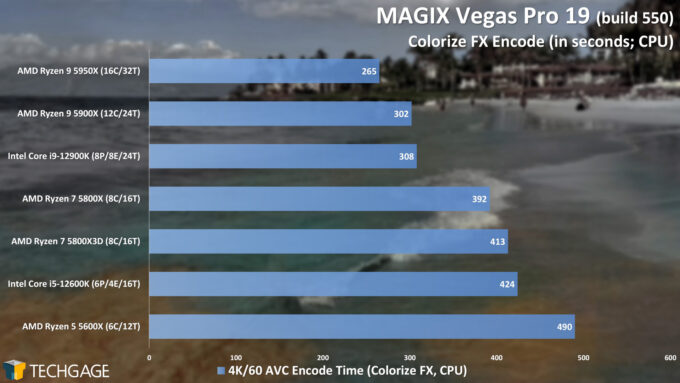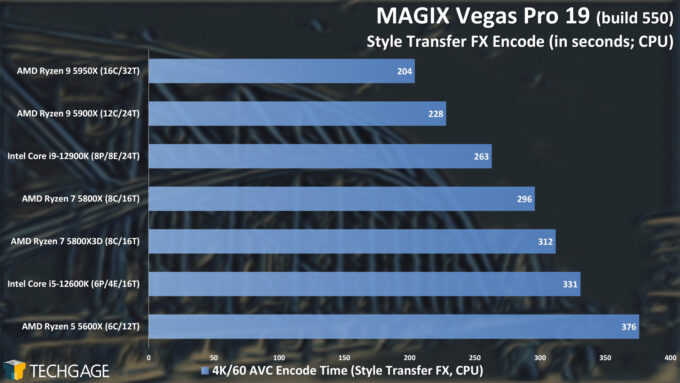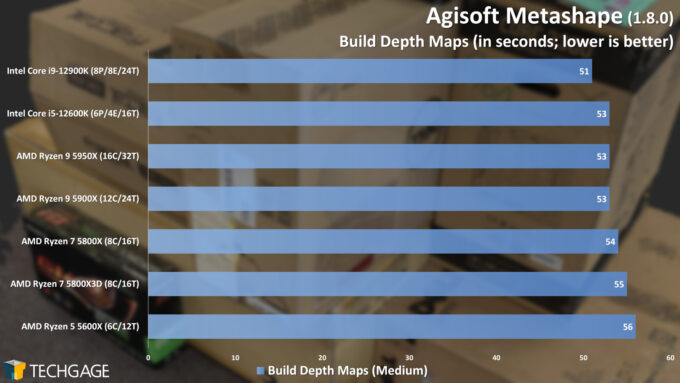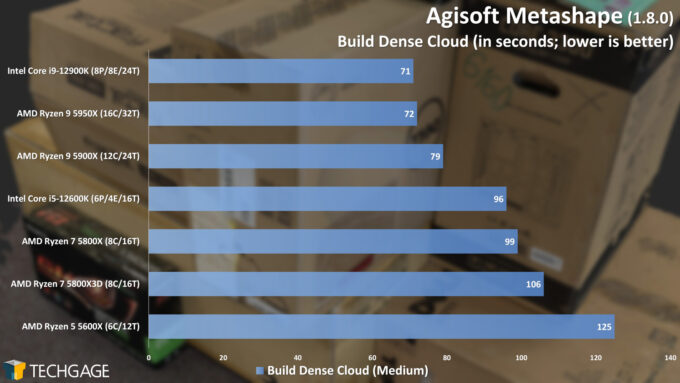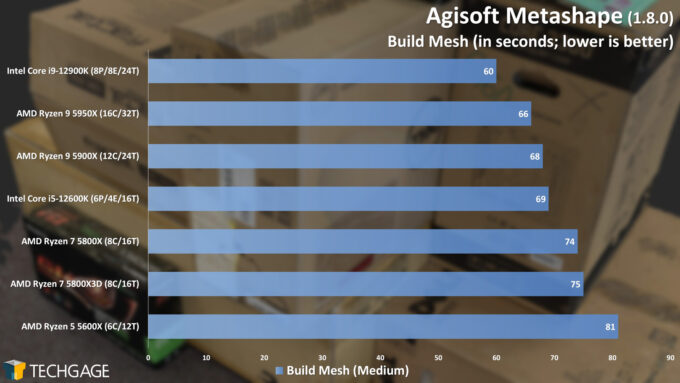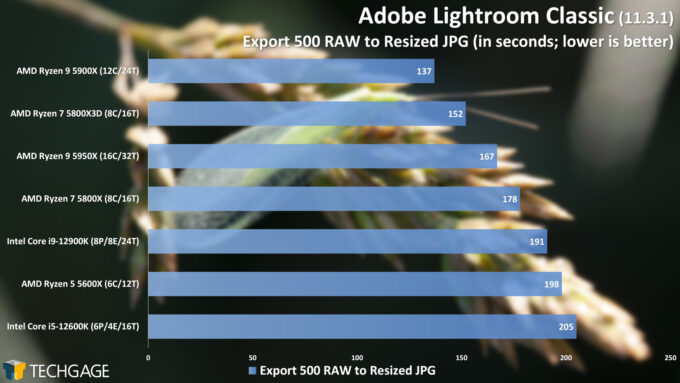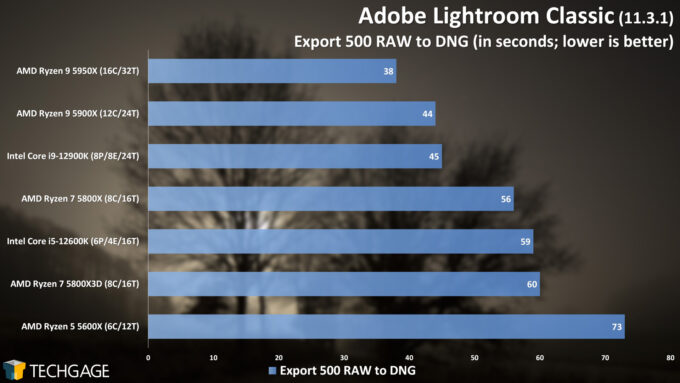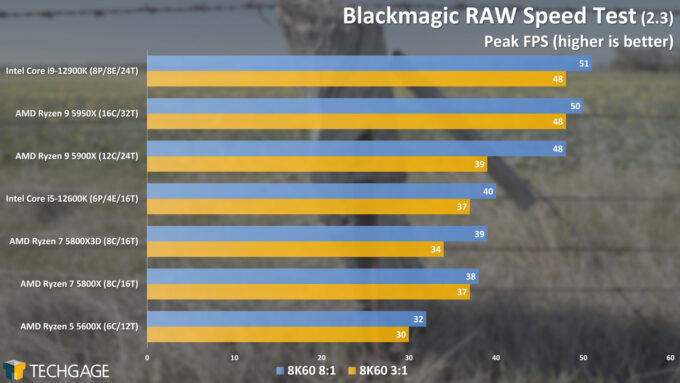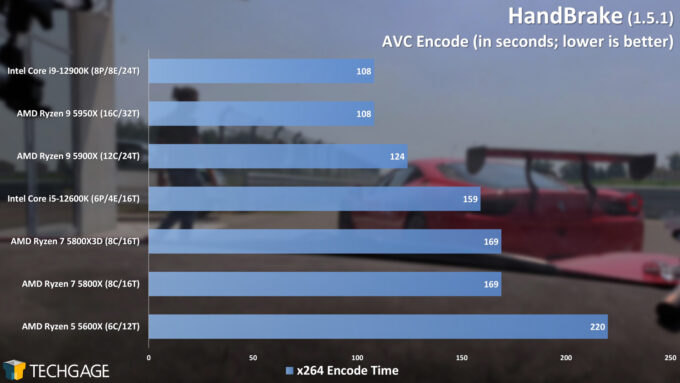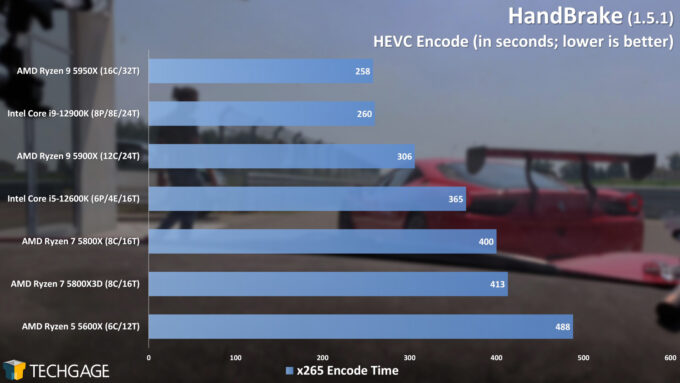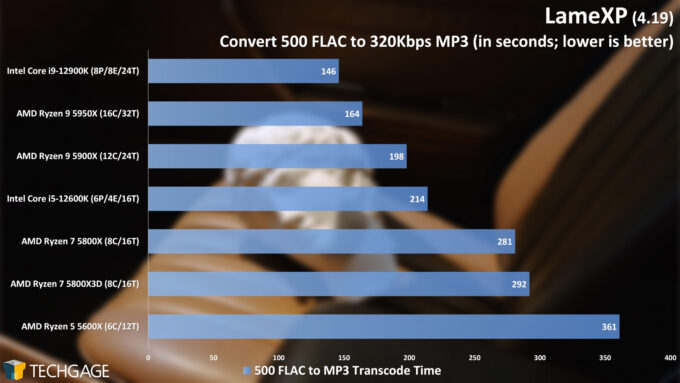- Qualcomm Launches Snapdragon 4 Gen 2 Mobile Platform
- AMD Launches Ryzen PRO 7000 Series Mobile & Desktop Platform
- Intel Launches Sleek Single-Slot Arc Pro A60 Workstation Graphics Card
- NVIDIA Announces Latest Ada Lovelace Additions: GeForce RTX 4060 Ti & RTX 4060
- Maxon Redshift With AMD Radeon GPU Rendering Support Now Available
Cache-Rich: AMD Ryzen 7 5800X3D Workstation Performance Review

First seen in its server-bound Milan-X EPYC, AMD’s brought its 3D V-Cache technology to consumers with the new Ryzen 7 5800XD. With triple the L3 cache vs. the original 5800X, the right workloads could exhibit a notable performance-boost. For our first look at the 5800X3D, we’re tackling our usual assortment of workstation performance scenarios.
Page 3 – Encoding: Premiere, VEGAS, Metashape, Lightroom, BRAW & More
Premiere Pro: Project Encodes
Encoding performance is something that’s hard to predict, because depending on the project, and the resolution, it’s not easy to tell which CPU will come out on top. Sometimes, higher clock speeds are beneficial, while other times, having more cores is.
In the case of these first two test results, it’s clear that despite having only 8 “performance” and 8 “efficiency” cores, Intel’s Core i9-12900K is a real force to be reckoned with. Unfortunately, these tests haven’t taken advantage of the additional cache found in the 5800X3D to any noticeable degree.
That all said, video encoding is something that can be greatly sped-up when a GPU is brought in for help. With the GeForce RTX 3070 put to work, interesting scaling becomes a thing of the past:
Similar to certain rendering engines, once a GPU is involved in Premiere Pro, it might take over for so much of the workload, that the CPU will have little to do. Project configuration, and the number of effects, could impact the scaling ability, but ultimately, you’re going to want to involve the GPU in this equation.
Premiere Pro: Transcoding
This review is focused on AMD’s Ryzen 7 5800X3D, but Intel seems to keep stealing the show so far, proving faster in every case than AMD’s top-end Ryzen 9 5950X. Unfortunately for AMD, the 5800X3D continues to sit behind the 5800X, proving that all of that extra cache is doing effectively nothing in these particular tests. Instead, the faster clock speeds of the 5800X help it keep ahead.
Once again, let’s reintroduce the GPU:
Yet again, we can see that with video encoding, the GPU can make an enormous difference in resulting encode times. In the case of the AVC > HEVC and ProRes > HEVC encodes, the GPU seems to have entirely taken over, delivering the same performance across the board. In other cases, decent scaling can be seen.
Ahead of the next round of Premiere Pro testing, we’re aiming to retune some of these tests, and include 8K > 4K tests, to go alongside the 8K > 8K, as in the past, we’ve seen different levels of scaling between them. We also gave the new Premiere Pro 22.4 a quick test during this round of testing, and let’s just say: we’re eager to get to it soon, because some of the performance upticks seem impressive.
VEGAS Pro
Since the last time we tested with VEGAS Pro, the scaling hasn’t changed too much. With the Median test, Intel’s 12900K again takes the top spot, while AMD’s 5950X does so for the AI-bound Colorize and Style Transfer tests. What started as a trend with Premiere Pro continues: video encoding does not seem to be the best use case for increased cache. The 5800X again places ahead of the 5800X3D in all three tests.
We’ve been planning to write a dedicated performance article for VEGAS Pro 19 ever since its release, but each time we revisit, we seem to encounter odd performance scaling, or just odd behavior in general. This is the reason why there is no CPU+GPU test above; the end results are just unpredictable. Despite that, we plan to dig in again soon, and see if we can get to the bottom of the anomalies.
Metashape
Of these three photogrammetry processes, it’s probably not too difficult to figure out which ones are more CPU-bound than GPU-bound. The Depths Maps generation results are barely interesting, only because so little CPU is required for the process, while Dense Cloud and Build Mesh use the CPU exclusively. Even still, the latter shows modest gain across the board, while Dense Cloud spices things up a bit, showing that extra cores can come in handy.
Lightroom Classic
Before receiving the Ryzen 7 5800X3D to test, the initial target we wanted to hit with it was Adobe Lightroom. The biggest reason for this is that AMD’s Zen architecture has always performed great with it, and at times, we wondered if the additional cache found in Ryzen chips was factoring in. Well, lo and behold: we see our first test result where the Ryzen 7 5800X3D manages to strut its stuff.
We’re not seeing tremendous gains here – 178 seconds to 152 seconds (5800X > 5800X3D) in the JPEG test, but we’re glad to see some proof of the cache being put to good use. That said, it’s only with the JPEG export that we saw obvious gains; in the DNG export, the 5800X again managed to pull ahead.
Because it’s such a glaring oddity: yes, the 12-core 5900X places ahead of the 16-core 5950X in the JPEG export test. This is one of those anomalies that just happens to creep up once in a while, and in this particular case, it’s persistent, as we saw the same behavior last spring, with Lightroom 10.X.
BRAW Speed Test
At quick glance, we thought BRAW Speed Test may be the second test in our arsenal that highlights an improvement on the cache-rich Ryzen 7 5800X3D, but in actuality, both it and the 5800X flip-flop their results, and ultimately deliver what could be chalked up as being normal benchmark variance.
HandBrake
To help wrap-up our video encode tests, HandBrake effectively repeats what we’ve seen from the others: the 5800X3D’s extra cache isn’t helping much in this particular scenario. Meanwhile, the 12900K and 5950X continue to fight an interesting battle for equivalency.
LameXP
Music conversion is a workload that’s not nearly as popular as it used to be, and it’s unfortunate, because today’s top-end CPUs make a notable improvement to performance. Yet again, we see an instance of Intel’s 8P+8E CPU beating out AMD’s 5950X, even with its 16 high-performance cores.
Support our efforts! With ad revenue at an all-time low for written websites, we're relying more than ever on reader support to help us continue putting so much effort into this type of content. You can support us by becoming a Patron, or by using our Amazon shopping affiliate links listed through our articles. Thanks for your support!




